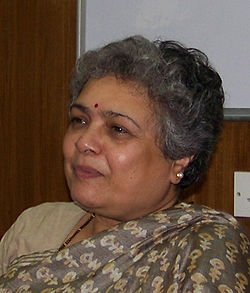Mrinal Pande | |
|---|---|
 | |
| Born | 26 February 1946 |
| Alma mater | Allahabad University George Washington University |
| Occupation(s) | Hindi story writer, editor, columnist, essayist |
| Years active | 1967–present |
Mrinal Pande (born 26 February 1946) is an Indian television personality, journalist and author, and until 2009 chief editor of Hindi daily Hindustan .